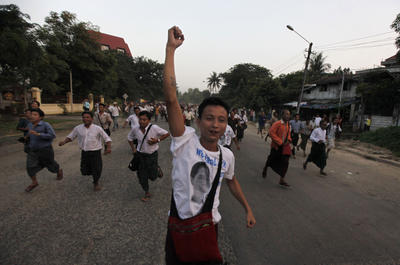Less than a week later, the iconic leader of Burma’s opposition, Aung San Suu Kyi, was freed from house arrest where she had been confined for 15 of the last 21 years. The implications from these momentous times in Burma are immense for Thailand, Southeast Asia and beyond.
Burma’s rigged elections have put the international community, largely comprising the major capitals of Europe and North America, in a quandary. As the Burmese dissident groups in those capitals have rejected the elections, Western governments will be hard-pressed to tread a fine line. In view of the West’s futile sanctions and in the absence of forceful regime change, the continuation of a wait-and-see approach through deft diplomacy in quiet places, such as building the opposition’s networks and human resource capacity inside the country, is advisable. That the generals in the State Peace and Development Council even bothered to go through this civilianisation sham to prolong military rule when it was not necessary, suggests that potential space is there for the West to help nudge a way forward by dually deploying both sticks and carrots.
China and India’s endorsements of Burma’s electoral setup are predictable. Both Asian giants have vested interests in Burma’s economic development, having courted Naypyidaw for strategic assets and natural resources. Burma has become the object of Southeast Asia’s own ‘great game’, courted by rising regional powers and other suitors for its abundant natural endowments and geo-strategic payoffs.
The receptive response from ASEAN is also a set piece. ASEAN went along with Burma’s seven-point road map, which culminated with the polls. The elections capped ASEAN’s longstanding ‘constructive engagement’ policy, and the regional organisation will rationalise that its approach for accepting the generals’ Burma into ASEAN in 1997 has now proved correct. Notwithstanding dissenting voices from Jakarta and Manila, ASEAN is poised to tick the electoral box on Burma’s democratic checklist and move on.
Moreover, Southeast Asia’s regional dynamics have now reverted back to the early 1990s when ASEAN-China relations were frictional. Tensions over overlapping claims in the South China Sea have resurfaced as China flexes it muscles in the lead up to its own leadership transition in 2012. The ASEAN-China enmity was a primary reason ASEAN accepted Burma then, and it will facilitate ASEAN’s approval of Burma’s elections now. In addition, none of the ASEAN member states except Indonesia and the Philippines to a lesser extent, are in a position to pontificate on democratic purity.
As the country most directly affected by events in Burma, Thailand also revealed its hand well before the elections. Prime Minister Abhisit Vejjajiva initial reaction to the polls was to stick to the stated timeframe of the military-sponsored constitution of a three-month period, before power is transferred to the elected government. Although his predecessor and mentor, former Prime Minister Chuan Leekpai, made a point of not setting foot on Burma’s soil in the late 1990s when the State Peace and Development Council was ensconced in power, Abhisit not only visited Naypyidaw but came home with a multi-billion-dollar port-development deal.
The port deal at Tavoy should be seen as part of a broader package of Thailand’s growing energy dependence on Burma. More than 70 per cent of Thai electricity generation is derived from natural gas, and nearly half of that portion is imported via Burma’s gas pipelines, with the rest made up of coal, hydro and petroleum sources. Renewable energy sources such as wind and solar are negligible. Nuclear power would be a viable alternative, as Vietnam’s imminent construction of two nuclear power plants attests. But for Thailand, nuclear power will need broad-based public discussion and hearings to promote trust and confidence and allay civil society concerns. Nuclear power is thus many years in the distance, if it ever materialises.
Thailand, in short, is beset by energy insecurity. On a per capita basis, Thailand’s electricity consumption is in the range of the developed economies in the Organisation for Economic Cooperation and Development. Its foreseeable energy future is reliant on natural gas. Until it can tap into reserves in unexplored areas in the Gulf of Thailand, particularly the overlapping claims with Cambodia, Thailand’s gas dependence on Burma will grow. In turn, such dependence will constrain Thai foreign policy vis-à-vis Burma.
Accordingly, Burma’s democratic noises reverberate in a quiet neighbourhood. India, China and ASEAN will toe Naypyidaw’s line, whereas Thailand’s energy dependence has sapped its government’s previous emphasis on human rights and democracy. While the far abroad talks tough on Burma, the near abroad appeases.
The exuberance and euphoria that greeted the post-election release of Ms Suu Kyi have placed Burma at a new crossroads. While its body politic could turn out well only over a long transition, it can degenerate badly in relatively short order. The risks of continued military rule fronted by a bogus electoral regime clashing with a pent-up and long-suffering opposition tempted to go for ‘too much, too soon’ will grow.
The West will need to persuade and bring Burma’s neighbours in line for external pressure to be effective. The chief challenge inside the country may be Ms Suu Kyi’s wherewithal to lie low while quietly building a broad coalition, even while allowing the civilianised generals to rule from behind-the-scenes, until enabling conditions are in place for the opposition to make its move.
Thitinan Pongsudhirak is Director of the Institute of Security and International Studies (ISIS), Faculty of Political Science, Chulalongkorn University, Bangkok.
This article was first published here at OpinionAsia.

